When I was a kid (like a kid kid who was under the age of ten), I had a very specific pet peeve regarding the entertainment that I consumed. It centered around the inevitable bashing of any character who showed an inclination toward logic, pragmatism, and worry. My thirst for adventure—oddly—developed gradually, over time. As a very small human, I had an overly-developed sense of caution about the world, and so I was drawn to characters who looked before leaping, who made plans, who considered dangers.
What I’m trying to say is, I hated Disney’s The Jungle Book because no one listened to Bagheera.
Despite all the unfortunate things we can associate with Rudyard Kipling’s stout faith in imperialism, and indeed the 1967 film itself, the fact remains that The Jungle Book was a touchstone for a lot of kids growing up. And since Disney films are the sort of thing that parents share with their kids, a fair share of us have seen the animated features that were released before we were born. I watched The Sword in the Stone, and Sleeping Beauty, and Snow White, and while some of these films made a lasting favorable impact (Robin Hood, The Great Mouse Detective), others did not (The Rescuers Down Under, The Fox and the Hound). The Jungle Book was in that latter category for one reason alone: Bagheera was my favorite character in the whole movie, and no one respected him.
This was not a new thing for me. I loved worriers and voices-of-reason as a kid. When I was five, C-3PO was the best part of Star Wars. It caused me acute physical distress to watch Pinocchio ignore the words of Jiminy Cricket. My favorite character in Mighty Morphin’ Power Rangers was Alpha 5, Zordon’s assistant robot who watched in constant terror as the Power Rangers got their butts kicked, his sandwich cookie head wobbling whenever something went wrong. Alice in Wonderland used to upset me because I hated how everyone snapped at (or tried to murder) Alice for attempting to make sense of her illogical surroundings and not knowing the rules. These were the folks who comforted me—they did what I would do in their given situations. I was too young to understand that these were generally not the characters who moved a story, who made things happen. Even if I had known, it’s doubtful that I would have cared much. Six-year-olds generally don’t.
For me, The Jungle Book was one of the greatest offenders of this set. It began with a wonderfully pragmatic, caring guide for Mowgli, then proceeded to make him look like a grumpy, boring drip to the audience. Baloo was the cool one. Baloo had the cool song, and a cool voice, and he let Mowgli do whatever he wanted. That’s what kids want, right? Of course they do. They want to hang out with someone who will gladly give them cake for breakfast. Who will let them stay up as late as they want. Who will throw the rulebook into the river and watch it float away while they eat their weight in sweet berries and burp the alphabet.
Except I liked doing things by the book. As a kid, I was an awful teacher’s pet. To this day, I still break out in a cold sweat if someone asks me to blatantly break a rule. No idea where it comes from, genetics-wise—my parents are both musicians. They certainly didn’t play by rules. Maybe my engineer grandpa? It doesn’t matter, the point is, Baloo was the enemy to my mind. Baloo was chaos, Baloo was time wasted, Baloo probably got you to try drugs for the first time and I had already been taught to SAY NO.
Yeah, I was kind of an intense child, I guess.
There are plenty of movies with characters like Bagheera, who fulfill the same function and foil within the narrative. But The Jungle Book goes a step farther than usual by painting him in a supremely unflattering light. This is because they use the character as a deliberate roadblock to everything fun that would happen in the film. Kids want Mowgli to stay in the jungle, they want to watch him try to be an elephant for a day, they want him to stop Shere Khan. Bagheera wants him to do the smart thing, and get out of mortal danger by living with his own kind. But if Mowgli did that, there would be no movie, so the two have a fight and Bagheera throws his paws in the air and has done with it. Then Mowgli meets Baloo, the cool guy, who agrees to keeps him around with the added benefit of no structure ever and infinite beach volleyball days.
There’s also a bit where Baloo pulls on Bagheera’s tail while the panther is sitting comfortably in a tree, and it makes me want to drop a rock on that carefree dude every time I see it. The action reads to me like nails on a chalkboard, but for eyes. Squeaky eyeball pain.
Then Mowgli gets kidnapped by monkeys, and Bagheera—who only pretended to be done with this whole circus because he cares—and Baloo rescue the kid. Bagheera finally explains who is after Mowgli, and tells Baloo that he has to convince the man-cub to go live with people. So Baloo tries, and Mowgli runs away from him, and because this eventually leads the kid right into Shere Khan’s clutches, it makes the very practical panther appear more at fault than anyone. If he hadn’t spoiled Baloo’s forever party, maybe it all would have turned out fine.
All Bagheera is really guilty of is making smart choices to keep the boy safe. But in the world of beloved fictional characters, the majority of the population aren’t going to cuddle the stuffed animal of a character who makes reliable decisions. They’re going to cuddle the one that says things like, “Let me tell you something, little britches,” and “He’s had a big day. It was a real sockeroo.” Baloo gets all the glory by getting swatted down by Shere Khan before the big dust up, and once the tiger’s run off, Bagheera goes to the trouble of eulogizing the guy while Mowgli stands by sniffling, but the point is that Baloo is funny, so he listens to Bagheera go on about how great he is before jumping up and shouting PSYCH I AM SO NOT DEAD. Because it’s hilarious to let people think they’ve lost you, and get them to mourn over your live body, all so you can pop up with a one-liner. That’s what cool guys do. They also give you incredibly original nicknames like “Baggy,” wait—what is actually going on here, why do people like this?
And then the reprise of “Bare Necessities” at the end of the film has Bagheera joining in, as though the movie is now reassuring the audience—it’s okay, the panther’s cool now, too! He gets it!
Bagheera doesn’t need to get it. He is perfectly lovely just as he is.
I just never really understood what the movie was trying to convey to me. And it didn’t help that the whole thing did eventually end with Mowgli going to the Man-Village after dispatching Shere Kahn. Like… the point is Bagheera was right, but too stick-in-the-mud to for anyone to take him seriously? Is that the actual moral of the story? That’s a terrible moral. It’s not even a moral, really, it’s just the plot resolving awkwardly as a ten-year-old boy decides to change his entire outlook on existence because he saw a girl for the very first time. It’s an ending that no rational human being can buy unless we actively engage with the idea that Mowgli has somehow figured out human social constructs in the space of thirty seconds, and is aware that this girl is someone he might want to get it on with in several years. It’s not “just a crush” when you decide to abandon the only life you understand for a song about water-carrying, is what I’m saying.
Because of my natural averseness, I was determined to steer clear of the current Jungle Book rendition, despite the fact that I liked all the actors involved and typically enjoy Jon Favreau as a director. Then a bunch of friends whose opinions I respect seemed to like it, so I took a chance. I was holding my breath against the expected two-ish hours of semi-aggravated boredom, when something magical happened. Bagheera was… awesome. He was a complete character beyond narrative function, whose cautiousness was not depicted as lamentable, whose concern for Mowgli was out of sheer love, who was never treated like a wet blanket or a stuffy control freak. He was the Bagheera I’d been shouting about since childhood, the one who took it upon himself to care for a infant human boy because he was noble and majestic, dammit, and everyone in the jungle knew it.
Perhaps storytelling simply outgrew the trends that made the Jungle Book cartoon so difficult for me to watch as a little one. We moved beyond the idea that being dependable and sensible were “boring” or “uninteresting” attributes, and realized that children could handle more complex characterizations. It does seem to be the trend for these live-action Disney revamps, and while they’re not particularly risky offerings, they can be more engaging than their predecessors in more ways than one.
All I know is, in the new film, Baloo tells Bagheera that Mowgli is a special kid, and when the panther replies “I know—I raised him,” I was all thanks movie, gonna cry now, and I didn’t even want to like you.
The film did me the extra favor of not showing good old Baloo in a favorable light the whole way through either—we get to see his selfish side, and his fear, and his excessive laziness isn’t depicted as a positive. He has his own journey to make, and he comes out better for it. He and Bagheera arrive at a mutual respect in their efforts to protect the kid. In fact, with their strengths combined, Bagheera and Baloo make excellent co-parents to Mowgli. Yes, I am advocating gay cross-species jungle dads. It’s a great idea. Way better than that Talespin cartoon.
There’s nothing quite like having six-year-old you vindicated. While I did eventually come to love characters who moved and shook and committed great acts, I will always have the deepest of soft spots for those pragmatic warriors, the angels on our shoulders. Because being that good usually doesn’t win you any prizes, and it never wins you as many accolades as the cool guy. But the Bagheeras of the world always mattered to me. I always saw them, heeded them, clung to every considered word.
The little worriers of the world need heroes, too. And sometimes those heroes are busy telling you the twenty-one ways you might die today, urging you to retreat when you want to press on. It may not make much sense to the rest, but that solid dose of truth can be far more comforting than a rousing speech or a smooth song any day of the week.
Emmet Asher-Perrin thinks this probably explains a lot of why she loved Spock, too. You can bug her on Twitter and Tumblr, and read more of her work here and elsewhere.










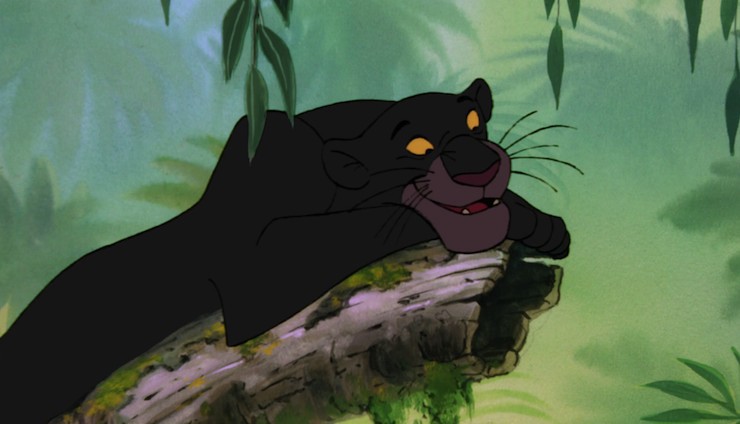
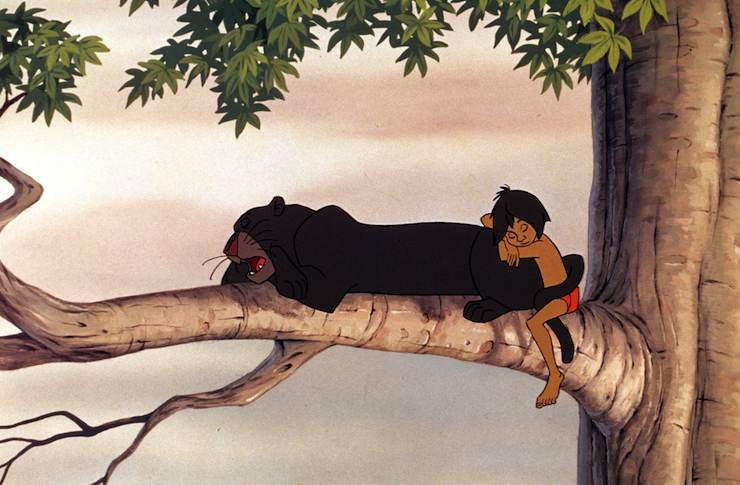
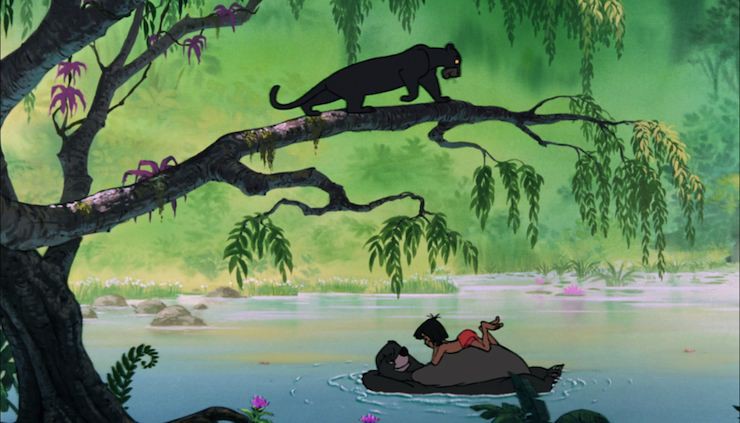
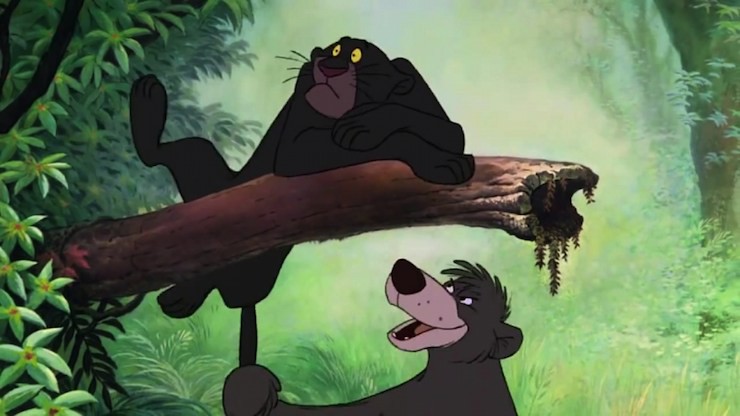
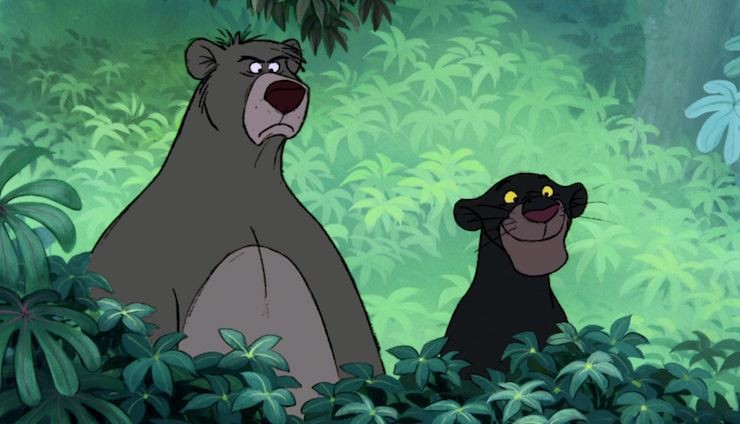
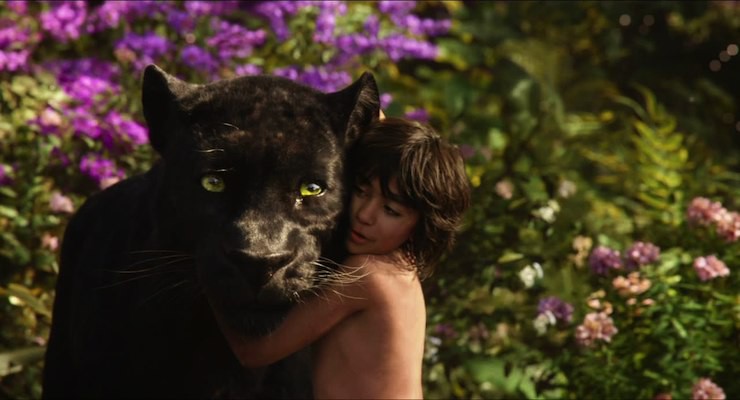
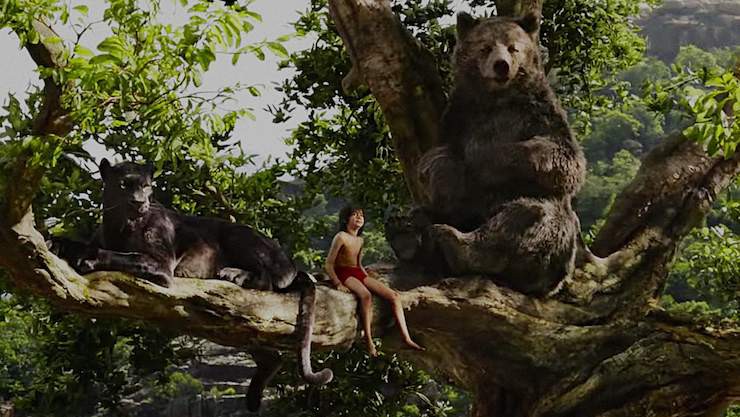
We are complete kindred spirits on this issue!
I literally walked out of the live-action Jungle Book movie saying to my husband how I was so happy at how they treated Bagheera’s character as steady and loving and protective and not a stick-in-the-mud just because he didn’t want Mowgli to hang around the jungle and get killed!!! As a fellow cautious child, I felt like Bagheera was made into a caricature of being sensible and doing the right thing.
I also LOVED the way that the live-action movie ended (as opposed to the cartoon film) with Mowgli getting to be where he belonged, sandwiched in between his gay cross-species jungle dads. <3 <3 <3
I wonder: have you gotten around to reading Kipling’s two books? Bagheera is a very different character in them. Or, he’s still somewhat cautious, but it’s less out of apparent fear and more out of deep wisdom. He is also much brasher and emotive, glorying in being one of the most feared things in the jungle. In the books, no one disregards Bagheera.
I’ve most often been a play-it-safe person too, with the same reaction to media all along. Playing it safe when reading one of those classic “Choose Your Own Adventure” stories always led me to the quickest endings; the more hopelessly reckless your choices were, the longer and more adventuresome the story was – so annoying! The most outrageous moment for me was watching the ST:TNG episode “Tapestry” where Jean-Luc decides to play it safe when he’s given a 2nd chance at life, then winds up as a lowly med officer instead of captain. I was literally fuming over that one.
And then you get older, and it starts to sink in. Playing it safe and smart has meant an even road with less valleys, yes – and less hills. Less risk equalling less chance at those higher achievement moments when the risk pays off. If you always invest in a insured savings account then your money is safe, but you’ll never be a millionaire either. And you’ll definitely never captain a star ship.
“To this day, I still break out in a cold sweat if someone asks me to blatantly break a rule. No idea where it comes from, genetics-wise—my parents are both musicians” – this made me laugh pretty hard, because I am the same way, and my parents are also musicians (rock and roll/blues, specifically – somewhat famous in the local scene where I grew up). My parents tease me that my ‘rebelling’ was basically becoming a strait-laced academic who basically avoided alcohol, drugs, sex, etc (I actually did have a span of years where I smoked…).
But there is another part of it that goes into that, which is that I also had a general hatred of the Baloo type characters, because I recognized those characters as the same charismatic ‘fun’ assholes who made my life miserable in school, but were still beloved by the other kids and teachers. I think that is also a big part of why I was a bit of a goody two shoes – I didn’t want to be like THEM, the jerks that broke all the rules and were mean, rude, disrespectful, etc. And maybe also I wanted to tell myself I was a bit smarter/wiser/more mature than they were.
And in truth I don’t regret any of that – I like how my life turned out and I like the person I am. I do tend to be naturally bookish and cautious and rule following and all that, and I like structure and organization. But it works for me. And at least for me, the rules are also what help me to be nice when I don’t want to be, etc (I get that some people are just naturally super friendly and awesome people, but I’m not. I’m super prickly and a bit misanthropic at my worst). I know what it’s like to be treated like crap, and so it’s an important part of my own code to not visit that upon others.
I like Bagheera too (I didn’t see Jungle Book as a kid, but I did as a young adult), is what I’m saying :)
Actually, my biggest TV neurosis was Alvin and the Chipmunks – that show made me physically nervous because I always knew Alvin was going to cause some type of horrible mishap and there’d be no way to stop it, and then they’d all get yelled at. To this day I can’t stand crazy hijinks type of humor where you have to watch a train wreck coming.
@3 – ah, cecrow I have the same issues with Tapestry, except I haven’t yet come around to the idea that getting into bar fights is a good life decision ;)
I was so pleased with Bagheera in the recent “Jungle Book”. I had loved this character in the animated film, and was also upset that no one took Bagheera’s words seriously. But Bagheera’s a good guy and caring and wise, and I am so happy that this current movie got everything I loved about Bagheera right!
@2 Good point. In Kipling’s stories in the First Jungle Book, Bagheera is the real badass. He’s the one who’s prowling the jungle, the one who’s gallant and charismatic (practically a feline Errol Flynn), who aids Mowgli in his revenge against the man-village in “Letting in the Jungle” in a wonderful scene where he terrifies an angry mob simply by yawning at them. Likewise, in “Kaa’s Hunting,” he cleverly manipulates the giant snake into helping them rescue Mowgli from the monkeys by playing on Kaa’s pride by insinuating that he’d overheard the monkeys mocking Kaa.
Meanwhile, Baloo, who’s described as a “sleepy old bear,” is the one who’s laboriously teaching Mowgli the jungle languages and laws and customs (supposedly, he’s a caricature of a “munshee,” a pedantic Indian tutor). He does get one great moment of physical courage in fighting off the monkeys, but not much beyond that.
This is pretty much how I viewed a lot of characters as a kid. I don’t think it bothered me as much, but its still a little cathartic to read this.
To be fair to Baloo pretending to be dead, he seemed to be kind of out of it for the first few minutes. I don’t think he deliberately meant to trick Bagheera.
I agree with you with almost everything, expect one point: you dissed Talespin. Talespin is awesome. I mean, Jungle Book + Wings with a side of Cheers, what’s not to like?
@2 and @7
wouldn’t change a word of either of your comments. I should add that the depiction of Kaa in the original movie pissed me off royally – in the books, he’s cool and cunning and a dreadful foe, but a good friend to anyone who treats him properly.
An okay article, but I have to question your assertion that Kipling had a “stout faith” in imperialism. For an author who wrote The Man Who Would Be King, which strikes me as an anti-imperialist misadventure, he must have questioned his faith at some point.
And as for the Star Trek episode Tapestry, I don’t think getting into bar fights as a good life decision was the point the episode was making. I think it was simply about causality and learning from the bad decisions we make in our formative years. In other words, Picard could only become Bagheera from being Baloo first (in the ’67 Disney version of the characters).
@11: “Picard could only become Bagheera from being Baloo first.” – Agreed, that’s the point the episode makes, and that’s why I don’t like it either. Because that’s such a cliché; and also because there’s a big difference between taking risks and being reckless, and the episode doesn’t acknowledge that difference.
As for the real Bagheera and Baloo (in the Disney version), does Bagheera joining in the song really mean that “he gets it”? He tried the whole film to get Mowgli to live with humans, and he finally succeeded. Couldn’t it mean that he can relax now, because that’s what sensible people (or panthers) do when they have successfully completed a difficult task?
My problem with Bagheera in the ’68 movie is, they made him gray instead of black, with that ridiculous paler face. Otherwise, pretty much agree with the distortion of the character of the cautious, far-thinking-ahead one as the eternal spoilsport. As kid, I was a mixture of too cautious sometimes and too misbehaving other times, so it seemed. And I was disgusted with how Mowgli fell for a creature who apparently had nothing more to look forward to than cooking and fetching water.
Of course I had read the original a couple or 3 years earlier. The scene where Bagheera scares the crap out of the villagers was in one edition shown in a nice illustration that I encountered before I read the passage. I didn’t like how Bagheera beat Mowgli up after the episode with the monkeys, because he had already suffered enough, but otherwise those are some darn good stories.
In the early 90’s, one Pamela Jekel came up with a “Third Jungle Book”. Anyone read that one?
You write great articles.
I always thought the point of Tapestry is everyone does dumb things in their 20’s in the famous Jean-Luc Picard. Stopping yourself from doing the dumb thing because you can isn’t a good idea it changes what you lean about yourself.
I liked Bagheera but I also liked Baloo in limited amounts even as a kid. I had more respect for the book version of the bear. I’m the one at parties or hanging out with friends who says that’s not a good idea or someone keep Oscar out of traffic. I’ve never been a C-3PO level of worrier.
“It centered around the inevitable bashing of any character who showed an inclination toward logic, pragmatism, and worry.”
Likewise. I remain a staunch defender of Mako as the most unappreciated hero of Korra, because he was those things. Everybody loves Bolin, the Baloo of the group, instead.
I can pretty much roundly state barfigts are a bad idea.
I agree wholeheartedly with all of this. The only difference is, I loved – and reread many times over – the book, and saw the movie much later. Oh, and only one of my parents is musician.
But I must add, recently I realized I’m slowly starting to like Baloo-like characters. Because they are so different from me. Also, if C3PO is the “Bagheera” of SW, what is Han Solo then…?
I always thought that Disney somehow did not like Bagheera, because of how badly they treated him in the movies. And it’s not getting better in the spin-offs like jungle book 2 or Jungle Cubs. Disney has made Bagheera to a completely different character as he appears in Kippling’s books, except one thing: he is still a black panther.
But after I saw the new life-action Jungle Book I changed my opinion. Disney definitely likes the panther. I’m very happy at how they treated Bagheera.
Besides Bagheera I also agree with you what you say about Baloo and how he appears in the movie. I like him much more in the new movie than in the animated movie from 1967.
I had forgotten how much of this I also thought as a kid until I read this. Probably for less pragmatic reasons- Bagheera was a cat, and I LOVED cats- but there were definitely elements of the same frustration. I never understood why people loved Baloo, and quite honestly, I’ve never been fond of Bare Necessities. A great read, as usual. :)
Walt Disney specifically told the people working on the animated movie NOT to read the books. I’ve always found it ironic, even amusing, that they got the characters so completely opposite from what they were in the books – Baloo being the teacher who was trying to pound the laws of the jungle into Mowgli’s head, Bagheera the more indulging one who thought he was being too hard on him; Kaa as an ally, even a friend; and Hathi the elephant being very much NOT a comic figure…
Presumably they learnt to follow the musical score. That is certainly following a rule. (And engineering definately involves creativity.)
Yes, I’ll chime in on this assessment, too. Never liked Baloo. Never saw what (some) others saw in him. “Jungle Book” affected child-me similarly to “Pinocchio”. In both movies, I looked down on the protagonist for admiring people I never would have admired, even as a little kid… and for not listening to the people worth listening to. This may make me sound like a goody-goody or a terrible snob, but I think, as you so well explain, Emily, it was really a matter of my personality profile. Not all children are drawn to the No-Rules Cool Dude.
I’m not so bothered by Baloo in TaleSpin; at least he has a job! True, he couldn’t keep the business afloat on his own, but he still seems considerably more responsible than Jungle Book Baloo.
I’m not planning to see the live-action “Jungle Book,” because I find it aesthetically unpleasant and unworkable. Too visually realistic to allow me to suspend disbelief. Even the stills in your post creep me out. But I’m very glad to hear that Disney complexified the characters of both Bagheera and Baloo, and treated Bagheera with more respect.
Aiyaiyaiyaiyai … why do I remember that?
You know what? You and Bagheera are like me due to the our being these ways:
1. way too strict
2. overly cautious and sensible
3. straitlaced
4. rigid
5. easily offended
6. hatred of caricatures
7. control fanatics
8. humorless
Unlike you, Lisamarie, and Bagheera though, I’m much more uptight, humorless, bookish, and unadventurous than you and him to the point where I wish for everyone to be like me all the time in ways that make me totally comfortable. In fact, I wish that all people would follow rules that I think they should follow without question. Besides, I’m sick of all the troublemakers there are enough to wish that they wouldn’t exist.
But I don’t need complexities because I like my rigidity and I wish that it rubbed off on others.
Wow, and all this time I thought I was a crazy person for hating these movies! haha.
For years I absolutely despised Balloo. In fact, he disgusted me. As a kid he was my arch enemy, everything I was determined never to be in life. Bagheera was my favorite. He was reason and logic, always dependable, the sensible one; someone I looked up to (as silly as that sounds, but I really did).
Back then it was black and white to me: Baloo was bad and Bagheera was good.
Following these principles while growing up, I tried very hard to act in a ‘Bagheera-like’ fashion and to never ever behave like the despicable, foolish and rebellious Baloo. I’d never forgive myself if I turned out like him.
Looking back, I see the stark difference between myself and my siblings: They ran around like mad pointlessly, make loud noises unnecessarily, didn’t think before acting, they were happy to disobey and argue back to authority. Basically they were normal kids, but I watched on and cringed. I saw them as rebellious and foolish and they saw me as a no-fun stick-in-the-mud. It’s the same situation as in the movie, Baloo’s and Bagheera.
Growing up might not have been as fun being Bagheera, but I can proudly say I wasn’t Baloo!